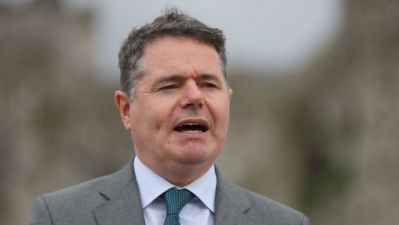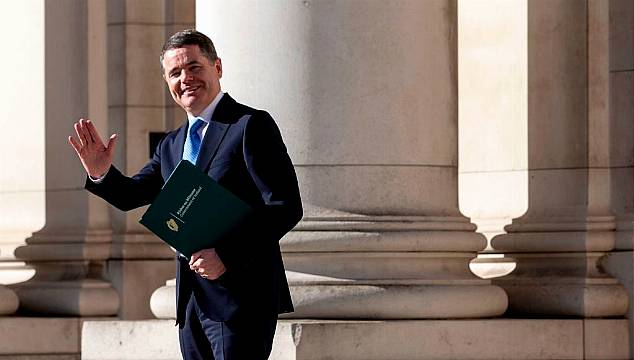The State dropped its opposition to an overhaul of global corporate tax rules, agreeing to give up the 12.5 per cent tax for large multinationals in a major boost to efforts to impose a minimum rate worldwide.
The Government declined to sign up to the initial deal in July, objecting to a proposed rate of “at least” 15 per cent.
An updated text this week dropped the “at least”, clearing the way for ministers to do what successive governments said they would never contemplate – giving up the low rate that has helped win the Republic investments and jobs for decades.
“Joining this agreement is an important decision for the next stage of Ireland's industrial policy - a decision that will ensure that Ireland is part of the solution,” Minister for Finance Paschal Donohoe told a news conference.
“This is a difficult and complex decision but I believe it is the right one.”
The Government has accepted my recommendation for Ireland to join the agreement at the @OECD on a new framework for taxing multinational companies.
The deal now provides certainty and strikes the right balance between our tax competitiveness and our broader place in the world https://t.co/gnsHcXg6XOAdvertisement— Paschal Donohoe (@Paschald) October 7, 2021
All bar a handful of the 140 countries involved signed up to the July deal, brokered by the Organisation for Economic Co-operation and Development (OECD), that marked the first rewriting of international tax rules in a generation.
The holdouts, which include fellow EU members Estonia and Hungary, cannot block the proposed changes. The 140 negotiating countries are due to meet on Friday to finalise the deal.
If Ireland had maintained its lower rate, multinationals that book profits there could be forced to pay the additional tax elsewhere under the proposals.
The Government said it had received assurances from the European Commission that Ireland can maintain the 12.5 per cent rate for firms with annual turnover below €750 million and keep tax incentives for research and development.
The Commission also promised it will stick faithfully to the OECD agreement and not seek a higher rate among member states, Mr Donohoe said.
'No substantial impact'
While the Government has wrestled with the prospective changes for months, it will not be the first change to the Irish tax regime.
A 10 per cent tax rate convinced Apple to set up a manufacturing facility in the in 1980s, with Microsoft and Intel following suit.
The government increased this to 12.5 pert cent in 1997 to comply with EU state aid rules and multinational jobs mushroomed.
The 12.5 per cent rate was fiercely defended in the intervening years, most notably when Ireland came under pressure to raise it as part of a 2010 international bailout.
Many analysts expect Ireland to remain competitive in the battle to attract foreign direct investment.
Some 1,500 multinationals that will be hit by the higher rate currently employ around 400,000 people or one in six workers in Ireland, Mr Donohoe said.
“We would be reasonably confident that this won't have a substantial impact,” said Kieran McQuinn, research professor at the Economic and Social Research Institute (ESRI) think tank.
“As a country matures, others factors such as the flexibility of our workforce, membership of the EU tend to become very important as well,” he added.
Two tax rates
Earlier on Thursday, the Tánaiste, Leo Varadkar, said Ireland will be able to operate two tax rates if it agreed to sign up to the OECD deal.
Mr Varadkar told the Dáil: “I spoke to the Minister for Finance this morning and he will be in a position to present to Cabinet this afternoon one of the things we have sought, which is the ability to continue to charge the 12.5 per cent rate to small and medium size companies.”
He said this will apply to companies with a turnover of less than €750 million.
“The Minister informed me today that we have received that assurance, that we can do that,” the Tánaiste added.
Labour’s Ged Nash called on the Government to publish updated figures on the financial impact of implementing a 15 per cent tax rate in Ireland.
“There is a huge information vacuum for those of us trying to responsibly interpret the Government’s position,” Mr Nash added.
“Could we gain revenue? Could we be quids in here?”
Mr Varadkar said existing estimates show Ireland could lose €2 billion a year in revenue from the change in corporate tax.
“That is only an estimate,” he said. “It’s based on certain assumptions which may or may not be correct.
“Our 12.5 per cent has been a huge success and is a really important part of our industrial policy.
Today @geraldnash asks the Tánaiste will the implications of the changes corporation tax be presented to Cabinet later today and will the govt publish them?
We need full transparency of this monumental decision that's about to be made 👇 pic.twitter.com/Gpwkes1oyH— The Labour Party (@labour) October 7, 2021
“Over a quarter of a million people work in multinational companies in Ireland, we want to keep those jobs and the 100,000 or so indirect jobs that arise from those jobs.
“We take in about €12 billion a year in corporate profit tax, that is roughly double what the average European country does on a per head basis.
“Our concerns relate to the issue of being ‘at least’, and we want to make sure that whatever rate is agreed is certain and won’t ratch it up over time.
“We want to make sure that countries that sign up to this actually implement it, and we don’t want to find ourselves implementing it and our competitors do not because that would be a disadvantage to us.”

People Before Profit TD Richard Boyd Barrett said: “Corporations we know are involved in an aggressive tax avoidance and don’t even pay anything close to the 12.5 per cent rate but pay about 5.5 per cent in reality, and some pay a lot less.
“Why do you think it’s okay to prevent a little bit extra tax being imposed on these staggeringly profitable corporations but you do nothing and oppose efforts to reduce the tax burden on ordinary working people when we pleaded not to impose a further tax hike through carbon taxes?”
Mr Varadkar said taxes should be “low, simple and fair”.







